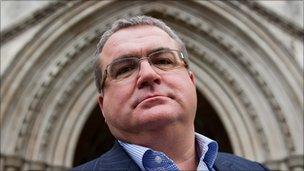'Nazi' jibe radio host loses legal bid
- Published

Mr Gaunt was at the High Court last month at the start of proceedings
A radio host who called a councillor a "Nazi" live on air has lost a legal bid to challenge Ofcom's decision to uphold complaints against him.
Jon Gaunt, who made the comments on Talksport in 2008, said the watchdog's stance was an unlawful interference with his freedom of expression.
Ofcom censured the presenter under its rules on offensive material, after receiving complaints from the public.
Mr Gaunt won permission in January to take action against Ofcom.
Investigation
Ofcom received 53 complaints over Mr Gaunt's interview with Redbridge councillor Michael Stark, which took place in November 2008.
The pair had been debating the council's decision to ban smokers from fostering children when Mr Gaunt called Mr Stark a "Nazi", a "health Nazi" and an "ignorant pig".
Mr Gaunt apologised on-air following the exchange, but Talksport sacked the presenter after its own investigation.
The media regulator noted the apology, but in June 2009 upheld the complaint under the rules regarding offensive material.
Mr Gaunt's lawyers argued that Ofcom infringed Mr Gaunt's right to free speech under article 10 of the European Convention on Human Rights and won the right to take the case to judicial review.
But at London's High Court on Tuesday, Sir Anthony May and Mr Justice Blair dismissed the proceedings.
Sir Anthony said Ofcom was justified in its conclusion.
"The broadcast was undoubtedly highly offensive to Mr Stark and was well capable of offending the broadcast audience," he said
"The essential point is that the offensive and abusive nature of the broadcast was gratuitous, having no factual content or justification."
Human rights
Mr Gaunt was refused permission to appeal although he can renew his application directly to the Court of Appeal.
Human rights group Liberty, which intervened in the case because of its "wider importance to free speech", said Mr Gaunt and his legal team intended to challenge the ruling.
Ofcom's chief executive Ed Richards, in a statement released after the court's decision, said: "We were perfectly happy for this case to be taken to court to review the way in which we interpret our statutory duties.
"We are very pleased that the High Court has recognised that we came to the right decision in this case. This is a thorough endorsement of our judgment in what was a difficult case."